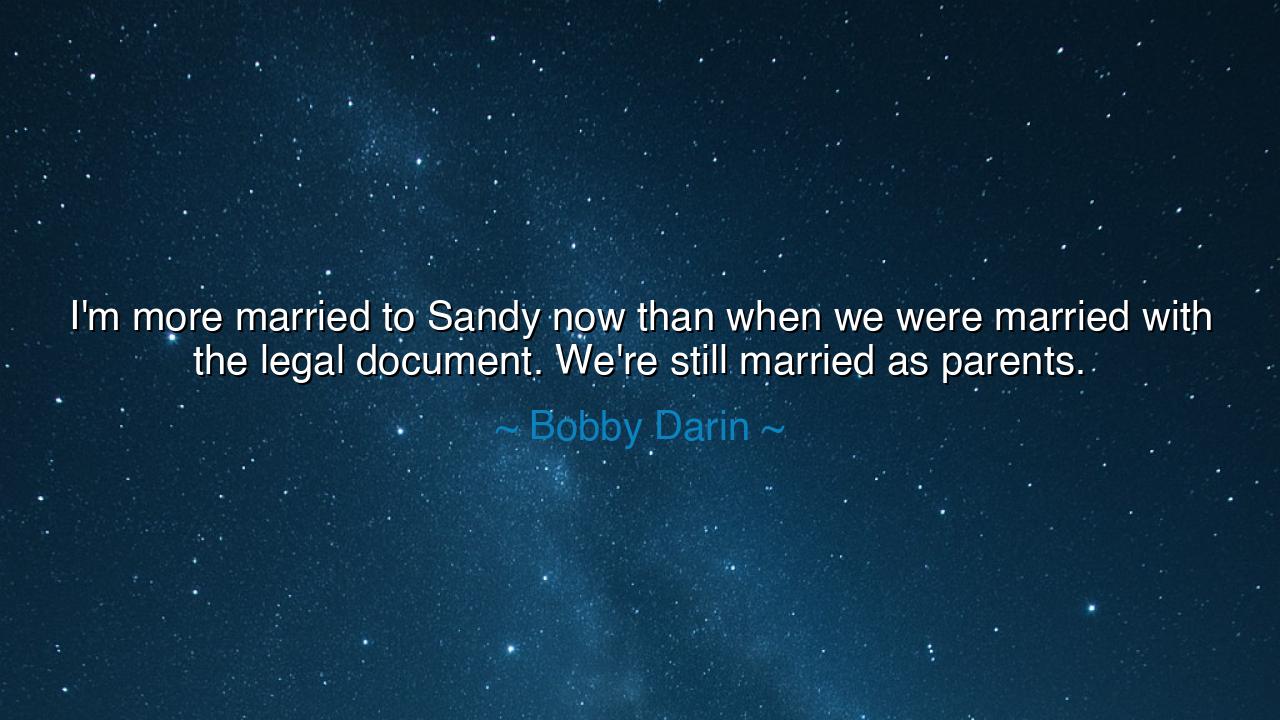
I'm more married to Sandy now than when we were married with the
I'm more married to Sandy now than when we were married with the legal document. We're still married as parents.






When Bobby Darin said, “I’m more married to Sandy now than when we were married with the legal document. We’re still married as parents,” he spoke not merely of love, but of the mysterious endurance of connection that survives the breaking of formal bonds. His words come from the heart of one who has lived through love’s rise and fall — who has seen that marriage, in its truest sense, is not written in ink nor sealed by law, but woven into the shared duties and emotions that continue long after vows are broken. In this reflection lies both sorrow and grace: the realization that while romance may fade, responsibility and affection may yet remain, enduring like embers in the ashes of a once-great fire.
The origin of this quote reaches back to Darin’s tumultuous yet tender relationship with Sandra Dee, the actress he married in 1960. Their union, once glittering with Hollywood glamour, eventually succumbed to the pressures of fame, ambition, and youth. They divorced in 1967 — yet their bond was not extinguished, for they shared a son, Dodd. In speaking these words, Darin revealed that even in separation, a deeper kind of union had taken shape — not born of passion, but of shared purpose. He and Sandy were no longer husband and wife by law, but they were joined forever as parents, bound by love for their child and by the invisible thread of shared creation. It is a profound recognition that the essence of marriage lies not in ceremony, but in continuity — in what two souls build together that no decree can dissolve.
His words echo through the corridors of human history, reminding us that the legal document — the marriage license, the decree, the parchment of state — is but a symbol, not the substance of love. The ancients knew this truth well. In ancient Greece, when marriages were arranged by family alliances, philosophers like Plutarch and Socrates spoke of a higher union — a marriage of souls — that transcended the rituals of society. Such a bond, they taught, is not broken by divorce or distance, for it lives in the shared virtues and responsibilities of two beings who have intertwined their destinies. Bobby Darin, in his modern way, uttered that same eternal wisdom — that though the law may divide, the heart and duty may still unite.
There is something heroic in Darin’s honesty. Many, after separation, speak only of pain or blame, but he speaks of continued devotion — not to a spouse, but to the sacred bond of parenthood. It is as if he is saying: love changes form, but its obligations do not vanish. Just as rivers that diverge still flow toward the same sea, so too do parents, even estranged, carry the shared current of their child’s life. In this, Darin’s statement becomes not only a confession, but a model for those who face the same path — that maturity in love is not measured by permanence, but by one’s ability to honor what remains when passion departs.
This understanding is reflected in the story of Marcus Aurelius, the philosopher-emperor, who after the loss of his beloved wife Faustina, continued to honor her in all things — raising their children in her memory, speaking her name in reverence. Though death, not divorce, had parted them, the principle is the same: love, once genuine, leaves behind a sacred duty. To remain faithful to that duty, even when the form of love has changed, is to act with virtue and grace. Darin’s words, then, are not of nostalgia, but of reverence — a recognition that even the broken vessel of a relationship may still carry water if one holds it with care.
In saying he was “more married” after divorce, Darin reminds us that marriage is not merely an act of law, but a state of being — a spiritual covenant that transcends signatures and ceremonies. It is possible, he suggests, to live apart yet remain united in spirit through shared compassion, mutual respect, and the enduring bond of creation — especially when that creation is a child. Such love does not fit the world’s definitions; it is quieter, wiser, born from forgiveness and acceptance. It is a love no longer fueled by desire, but by duty and remembrance.
Let this be the lesson for all who hear his words: that love’s ending need not be a war, nor its memory a wound. When bonds dissolve, do not let bitterness become your legacy; instead, let understanding remain. Honor what was built, protect what endures, and cherish the lives that came from your union. Parenthood, like love itself, is sacred — a lifelong partnership that no court can annul.
And so, from Bobby Darin’s tender reflection, we inherit a truth as old as time: that the heart knows ties the law cannot bind nor sever. True marriage, whether of souls or of parents, lives not in the signing of papers, but in the quiet, steadfast acts of care that continue long after the music fades. For though the song may end, the melody — shared between two hearts forever linked by love and legacy — plays on.






AAdministratorAdministrator
Welcome, honored guests. Please leave a comment, we will respond soon